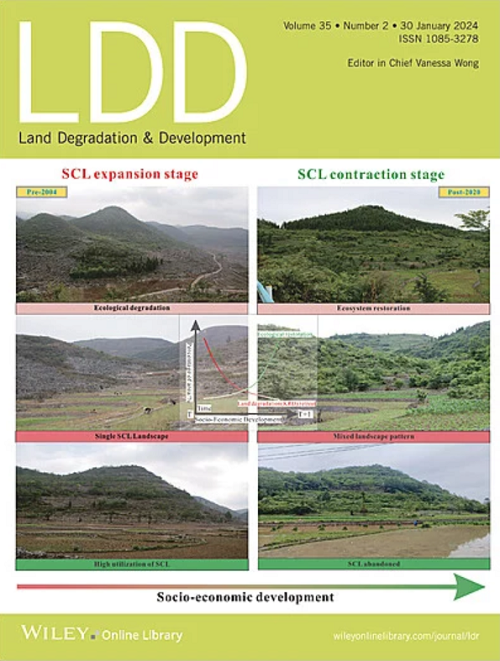Assessment of the Efficiency of Coupling Sustainable Well‐Being in Mountain Villages: A Case Study of Qinba Mountain Areas in China
IF 3.6
2区 农林科学
Q2 ENVIRONMENTAL SCIENCES
引用次数: 0
Abstract
Under the global Sustainable Development Goals initiative, the pursuit of well‐being is gradually shifting from wealth to sustainable development. Re‐examining the contribution of regional economic, ecological, and social development to the common creation of well‐being, analyzing their deep connections, will help us understand the multidimensional concepts and processes of development, and provide ideas for further promoting the construction of a more equitable and sustainable world. China is moving from comprehensive prosperity to common prosperity, and the continuous improvement of sustainable well‐being provides effective samples for our research. This study focuses on 46 counties in the Qinba Mountains Areas of China and constructs a coupled performance indicator system for sustainable well‐being in mountain villages. The Super SBM model is used to evaluate the matching performance of input and output factors, with Economic capital, Ecological capital, and Social capital as explanatory variables and Sustainable Happiness Index as the expected output. Research has found that: (1) There is a mismatch between the input and output factors of sustainable well‐being in the Qinba Mountain Areas, and management techniques are a key factor hindering the improvement of the coupling performance level of sustainable well‐being in the Qinba Mountain Areas; (2) The coupling performance level of sustainable happiness in the Qinba Mountain Areas is showing a downward trend, and only adjusting the input–output relationship by about 1.02% can achieve optimization and growth in performance level; (3) There is a significant shortage of input factors, with 87% of counties experiencing insufficient economic capital, about 76% experiencing insufficient arable land, and 41% experiencing insufficient social capital. In order to solve the above problems, it is necessary to strengthen the level of sustainable management in the ecological, economic, and social integration of the counties, respectively. Continuously promote capital investment in the mountain economy, such as logistics, industry, consumption, and public services, in order to upgrade the economy. Strict use of arable land and optimization of the land use structure, and implementation of arable land protection policies. Strengthening the level of social governance and enhancing the satisfaction of residents, thereby raising the level of sustainable well‐being. This research will provide a useful reference for achieving sustainable development goals in similar regions of the world.山区村落可持续福祉耦合效率评价——以秦巴山区为例
在全球可持续发展目标倡议下,对福祉的追求正逐渐从财富转向可持续发展。重新审视区域经济、生态和社会发展对共同创造福祉的贡献,分析它们之间的深层联系,将有助于我们理解发展的多维概念和过程,并为进一步推动建设一个更加公平和可持续的世界提供思路。中国正从全面富裕走向共同富裕,可持续幸福水平的不断提高为我们的研究提供了有效样本。本文以秦巴山区46个县域为研究对象,构建了山区村庄可持续幸福的耦合绩效指标体系。以经济资本、生态资本和社会资本为解释变量,以可持续幸福指数为预期产出,采用Super SBM模型评价投入产出要素的匹配绩效。研究发现:(1)秦巴山区可持续福祉投入产出要素不匹配,管理技术是阻碍秦巴山区可持续福祉耦合绩效水平提升的关键因素;(2)秦巴山区可持续幸福耦合绩效水平呈下降趋势,仅调整投入产出关系约1.02%即可实现绩效水平的优化和增长;(3)投入要素明显不足,87%的县域经济资本不足,约76%的县域耕地不足,41%的县域社会资本不足。要解决上述问题,需要加强县域生态一体化、经济一体化和社会一体化的可持续管理水平。持续推进物流、工业、消费、公共服务等山地经济资本投入,推动经济升级。严格使用耕地,优化土地利用结构,落实耕地保护政策。加强社会治理水平,提高居民满意度,从而提高可持续福祉水平。该研究将为世界类似地区实现可持续发展目标提供有益的参考。
本文章由计算机程序翻译,如有差异,请以英文原文为准。
求助全文
约1分钟内获得全文
求助全文
来源期刊

Land Degradation & Development
农林科学-环境科学
CiteScore
7.70
自引率
8.50%
发文量
379
审稿时长
5.5 months
期刊介绍:
Land Degradation & Development is an international journal which seeks to promote rational study of the recognition, monitoring, control and rehabilitation of degradation in terrestrial environments. The journal focuses on:
- what land degradation is;
- what causes land degradation;
- the impacts of land degradation
- the scale of land degradation;
- the history, current status or future trends of land degradation;
- avoidance, mitigation and control of land degradation;
- remedial actions to rehabilitate or restore degraded land;
- sustainable land management.
 求助内容:
求助内容: 应助结果提醒方式:
应助结果提醒方式:


